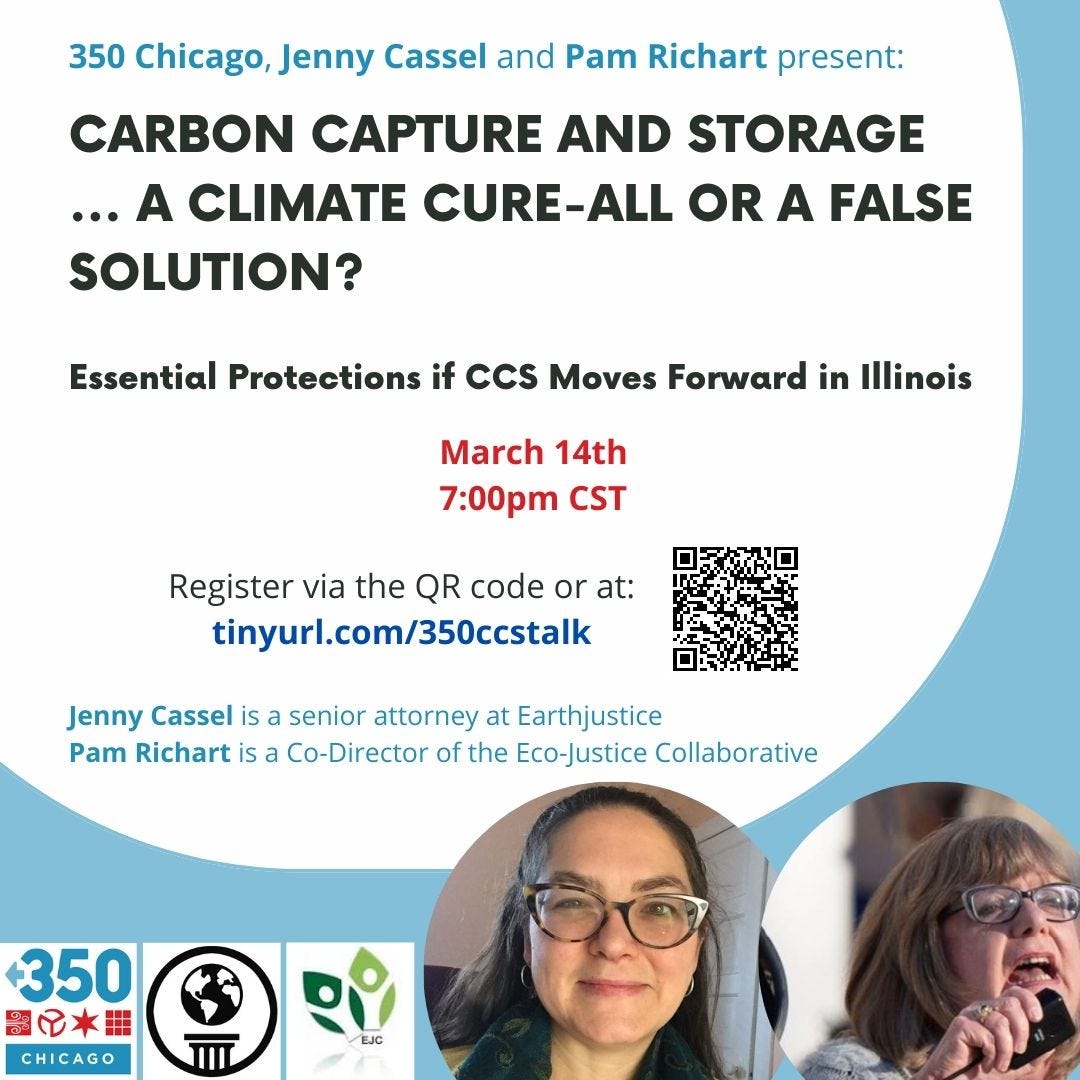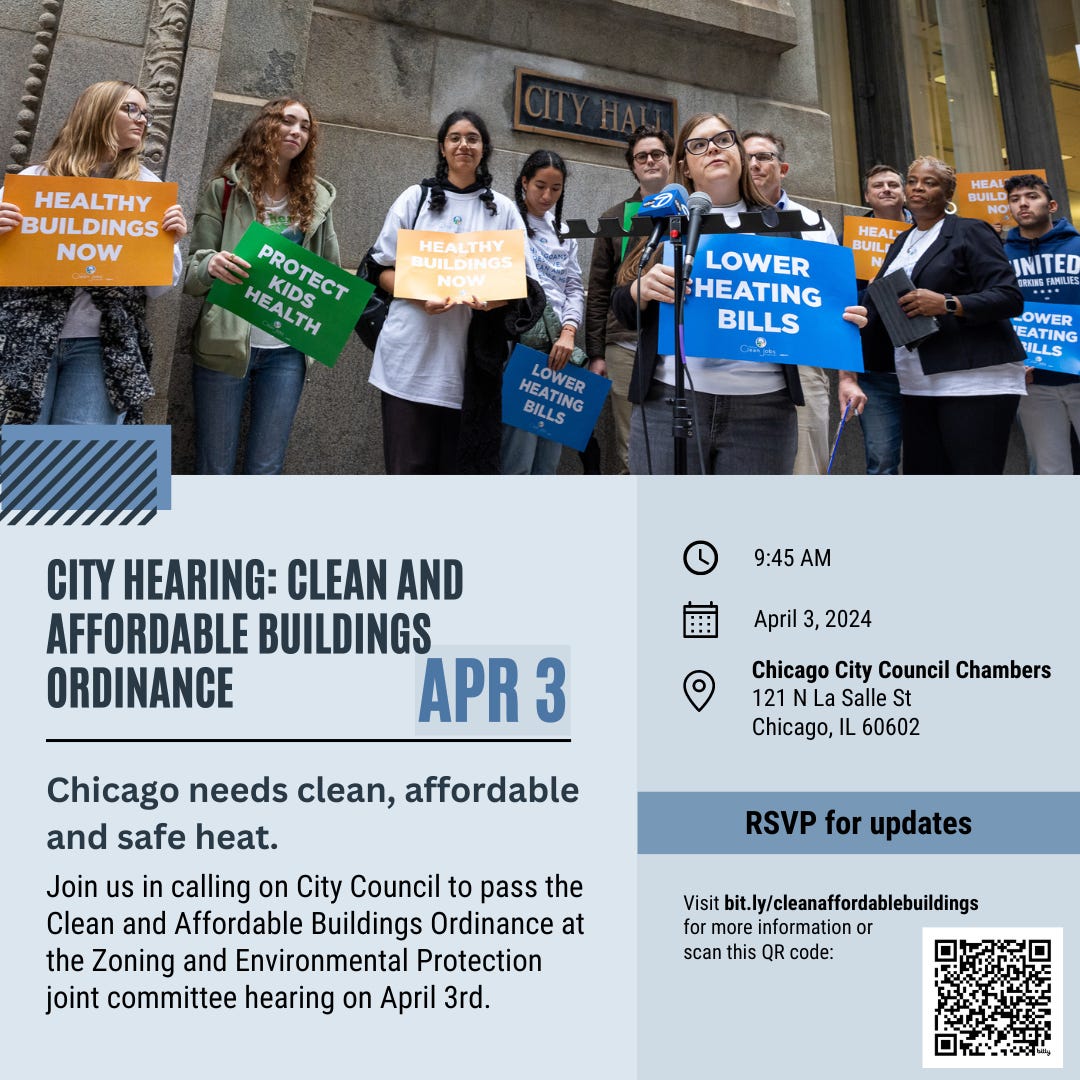|
 |
350 CHICAGO
Carbon Capture & Storage: A Climate Cure-All or a False Solution?
In our next entry in the 350 Chicago Speaker Series, we present Jenny Cassel from Earthjustice and Pam Richart from the Eco-Justice Collaborative to discuss essential CCS protections for Illinois
In This Issue
Chicago’s Clean & Affordable Buildings Ordinance (CABO)
350 Speaker Series: Carbon Capture & Storage
Illinois invests in Biotech
Biden Administration invests in Rural Clean Energy
Republican States Try to Block SEC Climate Disclosure Rule
In Brief
Illinois Invests in Biotech Sector
Illinois has just announced a $680 million investment to help develop the Illinois Fermentation and Agriculture Biomanufacturing Tech Hub. This represents an ever-increasing investment in the biotech sector which may lead to advances in developing alternative proteins. Studies have shown that eating a vegetarian or vegan diet can be a way to significantly reduce one’s own carbon footprint.
Biden Administration invests in Rural Clean Energy
The Biden administration just announced that $366 million will be allocated to 17 new energy projects in rural and remote areas which are located close to disadvantaged communities. These projects are designed to increase clean energy jobs available and include solar, battery energy storage, hydro, and resiliency projects.
Republican States Try to Block SEC Climate Disclosure Rule
10 Republican States just sued the SEC, attempting to block a new rule which would require public companies in the US to disclose climate-related risks facing their businesses. The SEC describes these rules as a way to ensure that “investors receive the complete, consistent, and comparable climate-related information they need in public filings to make their investment decisions.”
Support the Clean & Affordable Buildings Ordinance!
350 Chicago, as a member of the Illinois Clean Jobs Coalition, is partnering with Illinois PIRG to build support for the Clean and Affordable Buildings Ordinance (CABO) which will be the subject of a city council hearing on April 3rd at 9:45am, at the Chicago City Council Chambers at 121 N LaSalle St, Chicago, IL.
Nearly 1 in 5 Chicago residents are behind on their gas bills and gas rates are continuing to increase. Additionally, burning gas indoors exposes us to chemicals that cause cancer and asthma. The Clean & Affordable Buildings Ordinance is a key first step in the necessary transition away from fossil fuels that are expensive, harmful to our health, and terrible for our climate.
The ordinance sets an indoor emissions standard that would effectively eliminate the use of fossil fuels in newly constructed buildings in Chicago. Electric buildings are cheaper to build and maintain, especially after Peoples Gas’ record-breaking rate hike.
We have cheaper, cleaner, and safer ways to heat our homes. It’s time to transition away from gas and the easiest place to start is new buildings. That is why we are calling on the Chicago City Council to pass the Clean & Affordable Buildings Ordinance.
RSVP here: bit.ly/cleanaffordablebuildings
Sign the petition here: https://pirg.org/illinois/take-action/clean-affordable-buildings-ordinance-petition/
Carbon capture and storage … A climate cure-all or a false solution?
Essential protections if CCS moves forward in Illinois
Please join us for a presentation on Thursday March 14th at 7:00pm where Pam Richart and Jenny Cassel will highlight the hazards and risks of carbon capture, sequestration and the transport of CO2 by pipeline. They will discuss what is causing the mad dash to build these projects, and share key protections for CCS that have been included in Illinois' proposed legislation and why they are essential for protecting our health, safety, land, and water.
Jenny Cassel is a senior attorney with Earthjustice’s Clean Energy Program. She is based in Chicago. Jenny’s practice focuses on legislative, regulatory, permitting and litigation matters concerning coal ash pollution, other air and water pollution from fossil fuel-fired power plants, the transition to a renewable energy economy. In addition to current work on CCS legislation, Jenny drafted portions of recent Illinois environmental legislation, including 2019’s Coal Ash Pollution Prevention Act and the Climate and Equitable Jobs Act, signed in 2021. Prior to joining Earthjustice, Jenny worked as a staff attorney for the Environmental Law & Policy Center in Chicago, where she brought enforcement suits and permit challenges against numerous coal-fired power plants and co-led negotiations of a comprehensive fracking law in Illinois. Jenny is a graduate of Northwestern University School of Law and of Vassar College, and has a Masters of Science in Social Anthropology from Universidad Autónoma de Yucatán, Mexico.
Pam Richart is a land use and environmental planner by training and Co-Director of Eco-Justice Collaborative (EJC), a non-profit based in Champaign, Illinois. EJC was formed in 2008 to work for solutions to climate change that integrate environmental, economic, and social justice. Working collaboratively with organizations and residents affected by fossil fuel projects, EJC closed Chicago’s two coal plants, the city’s largest stationary source of CO2 emissions and health-harming particulates; won the decade-long battle to move toxic coal ash out of Illinois’ only National Scenic River; and helped pass the Coal Ash Pollution Prevention and the Climate and Equitable Jobs Acts.
Within the past two years, Pam helped found, and now serves as coordinator for the Coalition to Stop CO2 Pipelines, which consists of 13 Illinois non-profits and hundreds of landowners. This coalition stopped Navigator CO2 Ventures’ CO2 pipeline project and caused Wolf Carbon Solutions to temporarily withdraw its project in Illinois. Pam has expanded that role to include organizing to pass CCS legislation and a moratorium on CO2 pipelines.
350 Chicago Newsletter is free today. But if you enjoyed this post, you can tell 350 Chicago Newsletter that their writing is valuable by pledging a future subscription. You won't be charged unless they enable payments.

